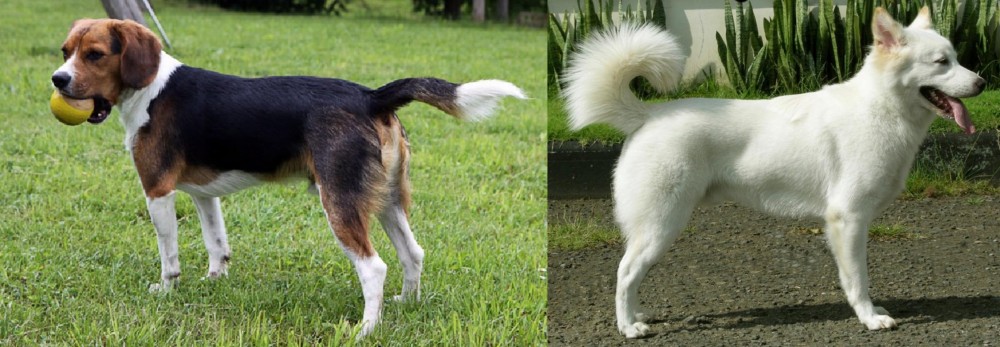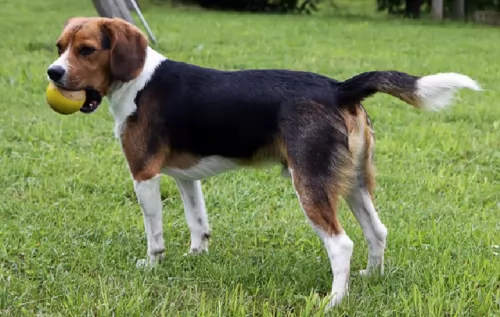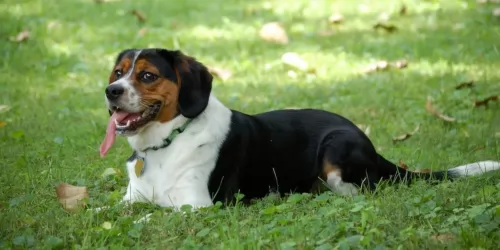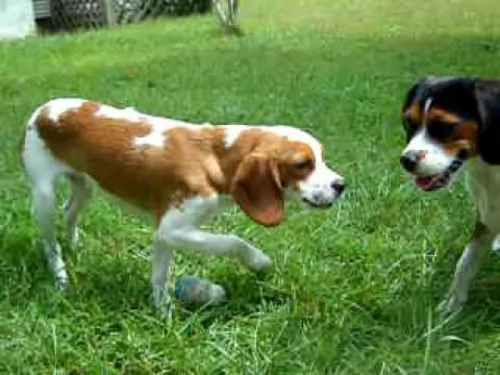 Petzlover
Petzlover Beaglier is originated from Australia but Kintamani is originated from Indonesia. Beaglier may grow 15 cm / 5 inches shorter than Kintamani. Beaglier may weigh 7 kg / 15 pounds lesser than Kintamani. Both Beaglier and Kintamani has almost same life span. Beaglier may have less litter size than Kintamani. Beaglier requires High Maintenance. But Kintamani requires Low Maintenance
Beaglier is originated from Australia but Kintamani is originated from Indonesia. Beaglier may grow 15 cm / 5 inches shorter than Kintamani. Beaglier may weigh 7 kg / 15 pounds lesser than Kintamani. Both Beaglier and Kintamani has almost same life span. Beaglier may have less litter size than Kintamani. Beaglier requires High Maintenance. But Kintamani requires Low Maintenance
 The Beaglier beginnings are set in Australia. Before around 30 years, breeders cross-breed the Beagle and the Cavalier King Charles Spaniel. The result actually turned out great – new we have a small sized breed with a wonderful, soft coat, very likeable looks, the calm and gentle dog which is very active despite his relaxed nature. They can be found around the globe nowadays and they are very popular because of their sweet nature.
The Beaglier beginnings are set in Australia. Before around 30 years, breeders cross-breed the Beagle and the Cavalier King Charles Spaniel. The result actually turned out great – new we have a small sized breed with a wonderful, soft coat, very likeable looks, the calm and gentle dog which is very active despite his relaxed nature. They can be found around the globe nowadays and they are very popular because of their sweet nature.
 The Kintamani dog is an ancient cross-breed and hails from Bali Island, Indonesia.
The Kintamani dog is an ancient cross-breed and hails from Bali Island, Indonesia.
The beautiful dog is classified into the working dog group.
It isn't sure how the dog developed, and it is believed that local Balinese feral dogs might have had a show in with bring the breed about. There are many stories regarding the origination of this breed but in 2006 the dog got recognition in Bali under the category 'distinct' dog breed.
There are efforts to see the Kintamani dog get global recognition.
 This small dog breed, called Beaglier and Beagler, has the look of his parents. Sometimes, they look more like the Spaniel, and sometimes they look more like the Beagle. This actually means that they are usually small, but can be, in some cases, even medium sized dog. They are usually tricoloured and in most cases, they have dark brown and cream hairs with white markings. They have longer ears, sometimes with more hairs if they look more like the Spaniel. They have large, dark brown eyes and usually dark nose. This breed is very loving and affectionate. They have a high need for a daily activity and they are the best choice for families with children.
This small dog breed, called Beaglier and Beagler, has the look of his parents. Sometimes, they look more like the Spaniel, and sometimes they look more like the Beagle. This actually means that they are usually small, but can be, in some cases, even medium sized dog. They are usually tricoloured and in most cases, they have dark brown and cream hairs with white markings. They have longer ears, sometimes with more hairs if they look more like the Spaniel. They have large, dark brown eyes and usually dark nose. This breed is very loving and affectionate. They have a high need for a daily activity and they are the best choice for families with children.
 Looking quite a bit like the Malamute, Chow and Samoyed, the Kintamani is a medium sized dog and has a broad face, erect ears, dark-brown eyes and a thickly plumed tail that is essentially held high.
Looking quite a bit like the Malamute, Chow and Samoyed, the Kintamani is a medium sized dog and has a broad face, erect ears, dark-brown eyes and a thickly plumed tail that is essentially held high.
The Kintamani is a Spitz type dog with an attractive appearance. Standing at 40 to 55cm, the Kintamani weighs in at roughly 13 to 17kg. The colors of the medium to long haired coat are white, beige, black and even brindle, though less common.
Having an independent nature and being territorial, your Kintamani can become aggressive with other dogs. He is very loving and accepting of his human family members though, becoming very loyal to one favorite family member.
They're alert and curious and make good watchdogs. He is also fond of swimming and climbing so he makes a good sport companion.
He is an intelligent dog and he can be easy to train. He is strong-minded and an independent thinker, so training and socialization will rein him in a bit and make him obedient and amicable.
 If you decide to bring a Beaglier to your family, it will be the best that you wait for your children to grow up a little bit. They are great to play buddy, but they get carried with the game and they can be very careless during the play. They fit perfectly with the children above the age of 5. They will run, jump, and do whatever your kid is about to do. They are friendly towards children they don’t know but they don’t do well with other animals they don’t know.
If you decide to bring a Beaglier to your family, it will be the best that you wait for your children to grow up a little bit. They are great to play buddy, but they get carried with the game and they can be very careless during the play. They fit perfectly with the children above the age of 5. They will run, jump, and do whatever your kid is about to do. They are friendly towards children they don’t know but they don’t do well with other animals they don’t know.
watchdog
One the main reasons why Beagliers are so much popular lay in their adaptability to any living conditions. They will fit in instantly in a family with children, but they will be happy as well if they live with just one person or even seniors. They can live indoors, houses and apartments without the yard. The Beaglier will enjoy the city parks, dog parks, beach, walking down the crowded streets. This breed is a not a quiet one – they will bark every time they notice something just to let you know. But, they are not aggressive type and they usually bark to communicate with people.
Usually, they are trained very easy. They have a stubborn nature, and if you learn how to get over with this temperament, you will be able to train and raise the sweetest dog ever. They should be trained and socialized while they are still puppies. Since they like too much, the best advice is to use treats to teach them everything that they will need to know. But, be careful with the feeding after the treats – Beagliers get easily obese if they are overfed.
 The Kintamani dog is an alert, bright, intelligent dog who will make you a good watchdog.
The Kintamani dog is an alert, bright, intelligent dog who will make you a good watchdog.
He also makes a companionable pet, and is friendly, loving and loyal to his human family. He has a social, lively temperament, and as people see what awesome pets they make, they are becoming more in demand as they are also easily trainable.
Do your duty towards this attractive dog and love and care for him like any other family member and he’ll be your most devoted best friend.
 The Beaglier flap ears can be a very great place for the fungi, bacteria and dirt. You will have to clean their ears with an ear cleaning solution and a soft tissue once a week, especially if your pet is playing outside.
The Beaglier flap ears can be a very great place for the fungi, bacteria and dirt. You will have to clean their ears with an ear cleaning solution and a soft tissue once a week, especially if your pet is playing outside.
Cherry eye: Starts as redness in the corner of the eye. Happens when the third eyelid gland slips out of its place and show up as a red blob in the corner of the eye. Sometimes, the gland gets back to its original place in a couple of days, but it will be the best if you can take your dog to the vet as soon as you notice any readiness in his eyes.
Glaucoma: Happens because of the high eye pressure. This affects the normal outflow of the eye fluids and can cause blindness if not treated. It is the best to for your beagle to regular eye checks since this condition is not easy to diagnose in the begging.
 You’re the only one who knows your dog, so you’re the one who will pick up signs that he isn’t well.
You’re the only one who knows your dog, so you’re the one who will pick up signs that he isn’t well.
You can tell a lot from your dog’s behavior, and often a dog that isn’t well will hide away in a corner. If you're worried about your pet’s health, get him to the vet for peace of mind.
Being a responsible dog owner requires you regularly performing body checks on your pet.
The canine parvovirus (CPV) infection is a very contagious viral illness that affects dogs. The intestinal form will have your dog vomiting, he won’t want to eat and he’ll have diarrhea.
The other less common type is the cardiac parvo where the heart muscle of a fetus is attacked, leading in all likelihood to death. Thankfully the incidence of the parvo-virus infection has been reduced by vaccination of puppies.
This is a tick-borne illness that is transmitted through deer ticks. It is a disease more typically seen in dogs from the northeast United States. Common signs of the illness are lameness, lethargy and enlarged lymph nodes. Most dogs respond well to antibiotic treatment.
Take a look inside your dog’s ears and check for itchiness, discharge and redness. Inside the dog’s ears it is very sensitive so if you don’t want to clean his ears, rather leave you vet to do it as you don’t want to perforate your dog’s eardrums.
 If you are not sure about the dog food you should give to your Beaglier considering the living environment and the lifestyle, it is always the best option to listen to the vet’s advice. They are prone to the obesity so you should keep a schedule that won’t be changed much. Feed them every day at the same time, no more than two meals per day once they get older than 6 months.
If you are not sure about the dog food you should give to your Beaglier considering the living environment and the lifestyle, it is always the best option to listen to the vet’s advice. They are prone to the obesity so you should keep a schedule that won’t be changed much. Feed them every day at the same time, no more than two meals per day once they get older than 6 months.
If you want your Beaglier to be happy, make sure you groom him daily. You will need about 5 minutes per day to brush him and keep him out of the tangles. Bathe then once in a month, that will be enough. Clip their nails regularly. Keep their ears cleaned.
They need a daily activity or they will get destructive. Be careful with the feeding since they get obese very quickly.
Since they are natural hunters, they will like to play chase. You can take them to the woods for a walk or for a run but make sure you train them to respond to your commands before you take them off the leash. They are very curious and they will easily wander off. They can be taught to play inside the house as well. They love to explore new areas so it will be great if you can take them with you for a holiday.
 The thick, lustrous coat of the Kintamani will need to be brushed twice a week because the coat is capable of getting burrs in. He sheds, so to keep the coat lustrous you want to be brushing him twice a week to remove all those loose hairs.
The thick, lustrous coat of the Kintamani will need to be brushed twice a week because the coat is capable of getting burrs in. He sheds, so to keep the coat lustrous you want to be brushing him twice a week to remove all those loose hairs.
The dog can adjust to life in the city or the countryside, but being energetic it is best that they have a reasonable sized garden or life on a farm. He will be quite happy with some good walks, but he'll want some more rough and tumble. He just loves joining you on a hike and climbing on rocks. These dogs are actually known for their climbing skills.
Kibble isn’t all equal, and dog owners have a huge choice, with the idea being to find the most nutritious one. Good food is key to good health for your Kintamani.
Your Kintamani puppy will require 4 meals a day. As he reaches adulthood you can start feeding him one or two meals a day.
The Kintamani has a beautiful thick coat and you want to ensure it stays that way by feeding him the best quality food there is. Top-quality dry food from a reputable brand will ensure balanced nutrition.
Read the packaging to ensure you’re giving him food that is appropriate to his age and for medium sized dogs. He will do well on some cooked chicken, brown rice, pasta and vegetables being added to this dry kibble every now and again as a treat.
If you’re unsure about whether he is getting the right kind of food in with a good balance of vitamins and minerals, you can always speak to your vet. Make sure that fresh, cool water is constantly available to him and wash his food and drink bowls regularly.